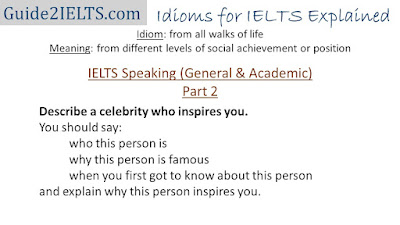If you would rather learn this from a video, click here.
Idiom: from all walks of life
Meaning: different types of people; from different levels of social achievement or position (professions, financial levels)
'from all walks of life' is the most common usage of the idiom. But there are quite a few variations which are in use.
Variations: from all different walks of life;
from different walks of life; from every walk of life; from every single walk of life
Example sentences:
- When you travel, you meet people from all walks of life.
- In my work in the retail sector, I come across customers from all walks of life.
Let's now look at a few examples of how this idiom can help you ace the IELTS Writing and Speaking tests.
If in part 1 of IELTS Speaking (General Training or Academic), the question you're asked is:
Why do you like your job?
you could say:
I think the primary reason I enjoy what I do is that I get to meet people from
all walks of life. As a result, every single day is a unique experience; an
adventure.
If in part 2 of IELTS Speaking (General Training or Academic, the cue card you're given is:
Describe
a celebrity who inspires you.
You
should say:
who this person is
why this person is famous
when you first got to know about
this person
and
explain why this person inspires you.
If you are asked this question in part 3 of IELTS Speaking (General Training or Academic)
How has technology
affected lifestyles since the past?
you could answer by saying:
Well, technology has had a tremendous impact on every aspect of the lifestyle of people from every single walk of life. Technology has touched lives, oftentimes negatively, and changed the way we live altogether.
Some say that music is simply a form of
entertainment. Others say that it plays an important role in society. Discuss
both views and give your opinion.
Music is an integral part of people from all walks
of life. What is more, one’s musical taste is not dependent on their financial
status, social standing, or professional achievements.
The first one is by the founder of Medicine Hunter Chris Kilham in which he is saying that powerful people and successful people can be from any social standing or any financial background but what is same for them all is their energy, their vitality, the way they live their life.
Powerful people come from all walks of life and
leave their mark upon the world in a variety of ways. But one thing is common
to them all. They move through the world with pure vitality. It is as though
all their switches have been turned on.
Chris Kilham
 |
There are so many different walks of life, so many
different personalities in the world. And no longer do you have to be a
chameleon and try and adapt to that environment – you can truly be yourself.
Hope Solo
The journey that I have undertaken, meeting people
from all walks of life and learning from them, has been my biggest achievement.
Aamir Khan
It’s so important to have manners and treat people
from all walks of life the way they should be treated.
David Beckham
Copyright © www.Guide2IELTS.com 2021. All rights reserved.
The questions are not mine. The answers are all mine.
The quotations are obviously not mine. The comments on them are all mine.












Comments
Post a Comment